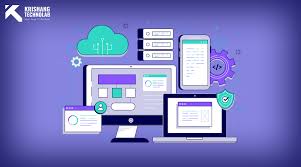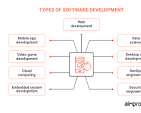The Essence of Software: Understanding the Basics
Software is often described as the invisible foundation of modern technology. It powers our devices, facilitates communication, and enables countless tasks to be performed efficiently. But at its core, software is simply software.
Whether it’s a complex enterprise application or a simple mobile game, all software shares common characteristics. It is a set of instructions and data that tell a computer how to perform specific tasks. These instructions are written by developers using programming languages and tools that translate human-readable code into machine-readable instructions.
One key aspect of software is its ability to be customized and adapted to suit different needs. Developers can create software tailored to specific industries, businesses, or even individual users. This flexibility makes software a versatile tool that can address a wide range of challenges and requirements.
The Evolution of Software
Over the years, software has evolved significantly in terms of complexity and functionality. From the early days of simple command-line programs to today’s sophisticated cloud-based applications, software has become increasingly powerful and user-friendly.
Advancements in technology have also led to the emergence of specialized types of software, such as artificial intelligence algorithms, virtual reality applications, and blockchain platforms. These innovations continue to push the boundaries of what software can achieve and how it can impact our daily lives.
Conclusion
In conclusion, while the world of software may seem vast and diverse, at its core, software is simply software. It represents a set of instructions that enable computers to perform tasks efficiently and effectively. By understanding the basics of software development and its evolution, we gain a deeper appreciation for the role that software plays in shaping our digital world.
8 Essential Tips for Maximizing Software Efficiency and Security
- Regularly update your software to ensure you have the latest features and security patches.
- Backup your data regularly to prevent loss in case of software malfunctions or crashes.
- Use strong and unique passwords for all your software accounts to enhance security.
- Avoid downloading software from untrusted sources to reduce the risk of malware infections.
- Learn keyboard shortcuts for commonly used functions in your software to increase efficiency.
- Close unused programs or tabs to free up system resources and improve overall performance.
- Customize settings in your software to suit your preferences and optimize workflow.
- Explore online tutorials or courses to enhance your skills and make the most of the software’s capabilities.
Regularly update your software to ensure you have the latest features and security patches.
Regularly updating your software is essential to ensure that you have access to the latest features and security patches. Software updates often include improvements in functionality, performance enhancements, and bug fixes that can enhance your overall user experience. Additionally, staying up-to-date with software updates helps protect your system from potential security vulnerabilities and cyber threats, ensuring that your data and information remain secure. By making a habit of keeping your software current, you can optimize its performance and safeguard your digital assets effectively.
Backup your data regularly to prevent loss in case of software malfunctions or crashes.
Backing up your data regularly is a crucial practice to safeguard against potential loss in the event of software malfunctions or crashes. By creating duplicate copies of your important files and storing them securely, you can ensure that your data remains accessible and protected. Whether it’s using cloud storage solutions, external hard drives, or automated backup tools, establishing a routine for data backup is essential for maintaining the integrity and continuity of your digital information.
Use strong and unique passwords for all your software accounts to enhance security.
Using strong and unique passwords for all your software accounts is essential to enhancing security. By creating complex passwords that combine letters, numbers, and special characters, you can significantly reduce the risk of unauthorized access to your accounts. Additionally, using different passwords for each account ensures that if one password is compromised, the rest of your accounts remain secure. Taking these simple steps can greatly enhance the overall security of your software accounts and help protect your sensitive information from potential threats.
Avoid downloading software from untrusted sources to reduce the risk of malware infections.
To minimize the risk of malware infections, it is crucial to steer clear of downloading software from untrusted sources. By sticking to reputable sources and official websites for software downloads, users can significantly reduce the likelihood of inadvertently installing malicious programs that could compromise the security and functionality of their devices. Vigilance in selecting trustworthy sources for software downloads is a simple yet effective way to safeguard against potential cyber threats and maintain a secure digital environment.
Learn keyboard shortcuts for commonly used functions in your software to increase efficiency.
Learning keyboard shortcuts for commonly used functions in your software is a valuable tip that can significantly boost your efficiency. By mastering these shortcuts, you can streamline your workflow and perform tasks more quickly and effortlessly. Whether you are navigating through menus, formatting text, or executing commands, using keyboard shortcuts can save you time and reduce the need to switch between mouse and keyboard inputs. Incorporating these time-saving techniques into your daily routine not only enhances your productivity but also allows you to focus more on the task at hand without being distracted by cumbersome navigation processes.
Close unused programs or tabs to free up system resources and improve overall performance.
Closing unused programs or tabs is a simple yet effective tip to optimize system performance. By freeing up valuable system resources, such as memory and processing power, users can experience smoother and more responsive operation of their devices. This practice not only enhances overall performance but also helps prevent potential slowdowns or crashes caused by resource-intensive applications running in the background. Taking the time to close unused programs or tabs can lead to a more efficient and enjoyable computing experience.
Customize settings in your software to suit your preferences and optimize workflow.
Customizing settings in your software is a valuable tip to enhance your user experience and streamline your workflow. By adjusting preferences to align with your specific needs and work habits, you can maximize efficiency and productivity. Whether it’s changing display options, setting keyboard shortcuts, or configuring notifications, tailoring the software to suit your preferences can make a significant difference in how effectively you interact with the tool. Embracing customization empowers you to create a personalized environment that supports your workflow and helps you achieve optimal results.
Explore online tutorials or courses to enhance your skills and make the most of the software’s capabilities.
To make the most of software’s capabilities, it is beneficial to explore online tutorials or courses that can enhance your skills. By engaging with structured learning resources, you can deepen your understanding of the software and unlock its full potential. Online tutorials and courses offer valuable insights, tips, and best practices that can help you become more proficient in using the software efficiently and effectively. Investing time in learning through these resources not only expands your skill set but also empowers you to leverage the features and functionalities of the software to achieve optimal results in your work or projects.



